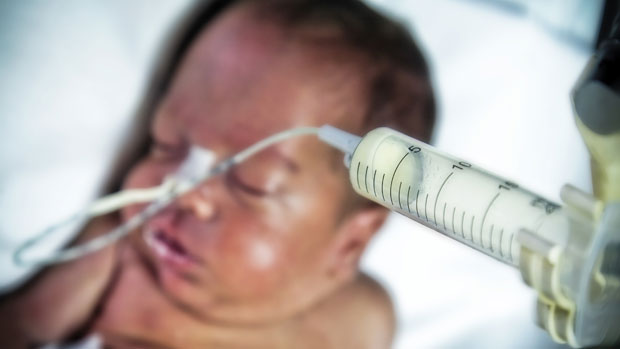One baby dead and 14 critically ill after drip contamination
Newborn babies poisoned by contaminated batch of nutrition drips in six different NHS hospitals

A free daily email with the biggest news stories of the day – and the best features from TheWeek.com
You are now subscribed
Your newsletter sign-up was successful
A newborn baby has died and 14 others are battling septicaemia after being poisoned by a contaminated batch of nutrition drips in six different NHS hospitals.
Health chiefs last night issued a public health alert, warning that the infected product may have been used in 22 hospitals across the country.
The newborn died of blood poisoning, caused by a common bacterium known as Bacillus cereus, on Sunday at Guy's and St Thomas' Hospital in London. The other 14 babies affected are said to be responding to antibiotics in hospitals in London, Brighton, Cambridge and Luton. All of the newborns, most of whom were premature, were being fed through a tube into their bloodstream.
The Week
Escape your echo chamber. Get the facts behind the news, plus analysis from multiple perspectives.

Sign up for The Week's Free Newsletters
From our morning news briefing to a weekly Good News Newsletter, get the best of The Week delivered directly to your inbox.
From our morning news briefing to a weekly Good News Newsletter, get the best of The Week delivered directly to your inbox.
The contamination is believed to have been accidental, with medical regulators investigating an incident last Thursday at a London manufacturing plant owned by ITH Pharma Ltd.
Public Health England (PHE) and the Medicines and Healthcare Products Regulatory Agency (MHRA) have launched an investigation.
All of the feeds in danger of contamination have been recalled and regulators emphasised that it was unlikely that any were still in use as the batch has passed its use-by date.
Adam Finn, professor of paediatrics at University of Bristol, told the Daily Telegraph the scenario was "everyone's worst nightmare".
A free daily email with the biggest news stories of the day – and the best features from TheWeek.com
ITH Pharma said it was "very saddened" to hear the news. "We are co-operating fully with the MHRA in the investigation, and are doing everything we can to help them establish the facts in this case as quickly as possible," it said.
A spokesman for Guy's and St Thomas's Trust said that all babies on the unit are being screened for the bacterium as a precaution and that enhanced infection control measures had been put in place. "These enhanced measures will remain in place until the trust is satisfied that no other babies are at risk," he said.
-
 5 calamitous cartoons about the Washington Post layoffs
5 calamitous cartoons about the Washington Post layoffsCartoons Artists take on a new chapter in journalism, democracy in darkness, and more
-
 Political cartoons for February 14
Political cartoons for February 14Cartoons Saturday's political cartoons include a Valentine's grift, Hillary on the hook, and more
-
 Tourangelle-style pork with prunes recipe
Tourangelle-style pork with prunes recipeThe Week Recommends This traditional, rustic dish is a French classic
-
 A real head scratcher: how scabies returned to the UK
A real head scratcher: how scabies returned to the UKThe Explainer The ‘Victorian-era’ condition is on the rise in the UK, and experts aren’t sure why
-
 How dangerous is the ‘K’ strain super-flu?
How dangerous is the ‘K’ strain super-flu?The Explainer Surge in cases of new variant H3N2 flu in UK and around the world
-
 The ‘menopause gold rush’
The ‘menopause gold rush’Under the Radar Women vulnerable to misinformation and marketing of ‘unregulated’ products
-
 How the care industry came to rely on migrant workers
How the care industry came to rely on migrant workersThe Explainer Government crackdown on recruiting workers abroad risks deepening care sector crisis, industry leaders warn
-
 Could medics' misgivings spell the end of the assisted dying bill?
Could medics' misgivings spell the end of the assisted dying bill?Today's Big Question The Royal College of Psychiatrists has identified 'serious concerns' with the landmark bill – and MPs are taking notice
-
 Washwood Heath: Birmingham's pioneering neighbourhood health service
Washwood Heath: Birmingham's pioneering neighbourhood health serviceIn the Spotlight NHS England chair says there is a 'really good argument this is the model for the future'
-
 The UK's first legal drug consumption room
The UK's first legal drug consumption roomThe Explainer 'Potentially transformative moment in UK drugs policy' as The Thistle opens in Glasgow
-
 How can the UK solve the adult social care crisis?
How can the UK solve the adult social care crisis?Today's Big Question New commission announced to turn our buckling care sector around: yet more delay or finally a way forward?